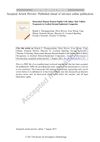Epigenetic Control of Skin and Hair Regeneration After Wounding
July 2014
in “
Experimental Dermatology
”
epigenetic regulation hair follicle regeneration immune system epidermal layers dermal layers wound-induced hair follicle neogenesis epidermal keratinocytes epithelial-mesenchymal transition EMT myofibroblasts wound repair dermal remodeling perivascular stromal cells differentiated cells wound reepithelialization epidermal stem cells gene expression hair follicle neogenesis epigenetic changes hair growth after injury skin layers wound healing new hair growth skin cells cell transition fibroblasts skin repair skin remodeling stem cells gene changes new hair formation

TLDR Skin and hair can regenerate after injury due to changes in gene activity, with potential links to how cancer spreads. Future research should focus on how new hair follicles form and the processes that trigger their creation.
The 2014 study "Epigenetic control of skin and hair regeneration after wounding" investigated the role of epigenetic regulation in skin and hair follicle regeneration post-injury. The research emphasized the crucial role of the immune system and the extensive remodeling of both the epidermal and dermal layers during this process. The study suggested that understanding these epigenetic changes could offer insights into how different healing components might come together for wound-induced hair follicle neogenesis. The research also drew parallels between wound healing and cancer metastasis, particularly focusing on the role of epidermal keratinocytes and the process of epithelial-mesenchymal transition (EMT). The study proposed that myofibroblasts, which play a role in wound repair and dermal remodeling, originate from perivascular stromal cells and differentiated cells. The researchers also speculated on the origin of new hair follicles after wound reepithelialization, suggesting that epidermal stem cells and dermal populations might alter their gene expression to enable migration into the wound and subsequent differentiation. The study concluded that future research should concentrate on detailed lineage analyses to determine the true origin of new hair follicles and the mechanisms for inducing hair follicle neogenesis.















